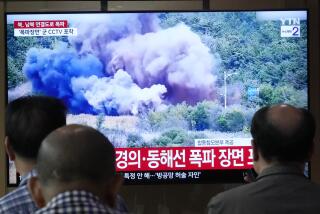North Korea says it will cut ties with the South over ship fallout
- Share via
BEIJING — A defiant North Korea said late Tuesday that it would sever all ties with South Korea, cut off communications and expel workers from a jointly run industrial park in a bellicose response to the South’s efforts to seek redress for the sinking of one of its ships.
Although South Korea has said it will not retaliate with force, instead seeking sanctions before the U.N. Security Council, Pyongyang earlier in the day accused Seoul of making a “deliberate provocation aimed to spark off another military conflict.”
In Beijing, Secretary of State Hillary Rodham Clinton said the United States stood firmly behind South Korea and urged China to join in condemning North Korea’s behavior, as Beijing did last year when the North tested a nuclear weapon.
“We expect to be working together with China in responding to North Korea’s provocative action, and promoting stability in the region,” Clinton said at the conclusion of two days of talks with Chinese officials. The talks were supposed to concentrate on economics, but ended up being overshadowed by the Korean crisis.
Clinton is to fly Wednesday to Seoul for meetings with Japanese and South Korean officials. Chinese Premier Wen Jiabao is also headed to Seoul to meet Friday with South Korean President Lee Myung-bak.
After Clinton’s meetings with the Chinese, U.S. officials could claim no progress in persuading Beijing to support U.N. deliberations on North Korea’s alleged attack, but said talks would at least continue.
Philip J. Crowley, chief State Department spokesman, said North Korea’s decision to sever ties with the South was odd, given the potential benefits to the impoverished state of stronger ties to its wealthier neighbor.
The South Korean naval vessel Cheonan was on patrol in the Yellow Sea on March 26 when an explosion ripped apart the hull, killing 46 crew members. Investigators last week declared what was already widely believed in South Korea: The sinking was the result of a North Korean torpedo attack.
The Chinese already have signaled their reluctance to punish North Korea, infuriating both the South Koreans and the Americans.
“It is disgusting the way the Chinese just sit on their hands and do nothing. This backward and clumsy behavior is not fitting their supposed place as the predominant power in Asia,” said Victor Cha, a former National Security Council Asia director who now is at a Washington think tank, the Center for Strategic and International Studies.
China’s cooperation is important because it can block or water down any U.N. resolution by virtue of its permanent seat on the Security Council and because almost everything North Korea imports or exports has to cross China’s borders.
North Korea shows no signs of flinching in what is increasingly a battle of nerves with South Korea.
Pyongyang issued a flurry of threats during the day. It accused South Korea of dispatching “dozens” of warships across the maritime border and said that it would “put into force practical military measures to defend its waters.”
North Korea said it had given permission for its soldiers to shoot at South Korean loudspeakers, a response to an announcement Monday that Seoul would resume broadcasting propaganda across the demilitarized zone that divides the peninsula.
The strongest measure, announced late in the day, was the severing of all relations and communications with South Korea. As a practical matter, that would mean closing an industrial park in Kaesong, just north of the DMZ, which was once the showcase for cooperation between the Koreas. More than half a century after the 1950-53 Korean War, there is still no telephone or postal service between the countries.
The threats looked like a tried-and-true North Korean maneuver: escalating the tensions to remind South Korea how vulnerable its economy is to any hint of renewed conflict on the peninsula. The Korean won dropped to its lowest level in 10 months and stocks throughout Asia sank, in part on fears of war.
“The North Koreans have an advantage here in that the South Koreans have a greater fear of war,” said Scott Snyder, an Asia Foundation expert who co-wrote a book about North Korea’s negotiating behavior.
Although the South Korean public is outraged about the sinking of the ship, it has no appetite for a military response to the North.
“This has been characterized as South Korea’s 9/11,” Snyder said, “but people know that any military response would just bring them greater pain.”
Times staff writer Paul Richter in Washington and Ju-min Park of The Times’ Seoul Bureau contributed to this report.
More to Read
Sign up for Essential California
The most important California stories and recommendations in your inbox every morning.
You may occasionally receive promotional content from the Los Angeles Times.










